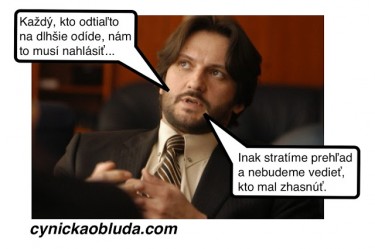Slovakia's president has vetoed a controversial new law that would require citizens who plan on leaving the country for more than 90 days to inform the nearest Ministry of Interior office of their intended whereabouts during that time.
The law, which would have taken effect July 1, 2013, intends to remedy a problem highlighted most recently when authorities were unable to deliver a court summons to Slovak Prime Minister Robert Fico, part of a lawsuit he is facing over disparaging comments he made about his predecessor, because his current place of residence is not on record.
Minister of Interior Róbert Kaliňák justified the legislation by explaining [sk] that the state needs to know where to deliver official letters and summons to citizens not currently at their permanent address.
But the law was met with public outcry. On the initiative of opposition parties, a petition was started and some 2,000 people signed it, asking the president to veto this new law [sk]. On June 16, 2013, President Ivan Gašparovič did veto the new requirement, but for other reasons, citing that some of the formulations within the law required modifications [sk] before it could be passed.
The bill is expected to be reviewed by Parliament again.
More than on the petition, however, anger was highly visible on blogs and social networks, with satirical images and sarcastic reports of whereabouts from citizens submitted through the Ministry's form for reporting this on its website. Many of them could be found on a Facebook fan page titled Conscientious Citizens Reporting Their Location to Minister Kalinak [sk]. Users are also taking screenshots of satirical “reports” to the Ministry and posting the screenshots on the popular local online forum Gulas.sme.sk. One “conscientious” citizen said:

Screenshot of website form from the Ministry of Interior.
… ide ťažký víkend a keď sa to zvrtne neviem kde skončím… ale v nedeľu som späť, Kali!
A hard weekend up ahead and I do not know where I will end up… but Sunday I'm back, Kali!
Another user simply ridiculed the topic:
hlásim že poidem do lesa
I'm reporting that I will be going to the woods
And some users went into fine detail of their planned whereabouts:
Dobrý deň, teraz sedim v kancelarii, o minutku planujem ist srat, ale o stvrt hodinky by som mal byt spat v pracovni.
Good day, for now I'm sitting in the office, in a minute I'm planning on going to the toilet, but in 15 minutes I'll be back.
For blogger Tibor Pospíšil, this law brings back memories of the communist era, when the country was closed off by barbed wire and the last Czechoslovakian President Gustáv Husák said that “Borders are not a promenade”.
In a similar tone, Peter Mikletič nominated Minister of Interior Kalinak for the Lenin Prize.
Blogger Maroš Marko wrote about fear that this is just the first step in something larger and more sinister:
Totalita poväčšinou prichádza veľmi nenápadne
Totalitarianism often comes very quietly
Tomáš Homola also viewed this new legislature as a dangerous sign:
SMEROM k totalitnému štátu
in the DIRECTION of a totalitarian state” [SMER, meaning “direction”, is the current political party in power]
Maroš Ivanič is another blogger who expressed this opinion that:
Ak si založíme Kaliňákov obojok tak si nič lepšie nezaslúžime
If we accept Kalinak's collar than we deserve nothing better
The new law is in fact just an amendment to existing laws in which reporting whereabouts was not “mandatory”, as it is in this new version. Citizens now risk paying a fine, although after criticism Kaliňák later stated [sk] that the fine would not be enforced.
In regards to this state law, blogger Bosák posed a question [sk]:
Pán Kaliňák, kedy bude hlásiť svoj pobyt predseda vlády?
Mr. Kalinak, when will the Prime Minister report his whereabouts?
Ján Škrobák, a lawyer and university professor, was the first to publicly explain the legal faults of this new law by asking why “staying abroad – which did not matter for years, now suddenly bothers [the state]?”. He also explains [sk] that this law, in its new seemingly stricter formulation, still implies that simply not announcing one's “departure in an of itself is not and will be not an offense”.
Ľubomír Drinka published a price list of verification of electronic signatures on his blog to show possible alternative reasoning behind this new law. Verification of electronic signatures is a requirement for all official email communication in Slovakia and citizens would need to verify their signature every time they would like to report an extended stay from abroad or through the Ministry's website, instead of coming back into the country to report this. This sheds a different perspective on the law, in particular because the fine for not verifying an electronic signature is several times more than the 33-euro fine (about 44 US dollars) if citizens do not report their whereabouts for stays of 90 days or more outside Slovakia's borders.
Dušan Kosec wrote on his blog that the measure may be preventative:
Nahlásenie pobytu – možná prevencia proti exodu slovenských občanov
Reporting of whereabouts – possible prevention against the exodus of Slovak citizens
Cynická Obluda had a similar opinion in the image below and a blog post titled “Waiting For the Last One” that evokes a long-standing joke in some Central and Eastern European countries that, due to large tendencies toward emigration over the decades, the last one to leave the country should not forget to turn out the lights.

Satirical image of Minister Róbert Kaliňák by Cynická obluda. Used with permission.
Čakanie na posledného
Každý, kto odtiaľto na dlhšie odíde, nám to musí nahlásiť…
Inak stratíme prehľad a nebudeme vedieť, kto mal zhasnúť.
Waiting for the last one [to leave].
Everyone who leaves here for a longer period of time must report it.
Otherwise we will lose overview and will not know who should turn the lights off.
Some humorously speculated in an edited image that the conception of this law might have been influenced by Slovakia's national hockey team participating in the recent Ice Hockey World Championships:

Image by user Nikola on www.gulas.sme.sk. Used with permission.
Príčina vypadnutia s Fínmi
Chlapci si po vyrovnaní uvedomili,
že by mohli dostať pokutu
za predĺžený pobyt v zahraničí,
preto nechceli nič riskovať.
Why did Slovakian hockey players lose to Finland
[Coach]: The boys, after evening the score, suddenly realized that they might be fined for staying abroad longer than intended, so they did not want to risk it







2 comments
Wow, shameful